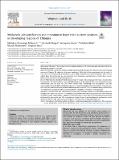Midwives’ Job Satisfaction and Intention to Leave their Current Position in Developing Regions of Ethiopia
Publication Date
2021-02-25Type
Article, Journalviews
downloads
Metadata
Show full item recordCitation
Muluneh, M.D., Moges, G., Abebe, S.A., Hailu, Y., Makonnen, M., & Stulz, V. (2021). Midwives' job satisfaction and intention to leave their current position in developing regions of Ethiopia. Women and birth : journal of the Australian College of Midwives.
Abstract/
Background: The aim of this research was to analyze midwives’ job satisfaction and intention to leave in developing regions of Ethiopia. Methods: A facility-based cross-sectional study was conducted amongst 107 midwives in four developing regions of Ethiopia. All midwives who were working in 26 health facilities participated in the study. A structured self-administered questionnaire, and in depth key informant interview guides, were used to collect data. Job satisfaction was measured by nine dimensions and intention to leave their current position was measured using three questions. Results: More than two-thirds (67%) ofthe midwives were female, with a mean age of 26.1 (sd 4.2) years old. Less than half(45%) ofthemidwives were satisfied with their job, less than half(42%) were satisfied with ‘work environment’ and less than half (45%) were satisfied with ‘relationship with management’ and ‘job requirements’. Relatively better satisfaction rates were reported regarding ‘professional status’, of which more than half (56%) of midwives were satisfied, followed by more than half (54%) of midwives being satisfied with ‘staff interaction’. Almost two-fifths (39%) of midwives intended to leave their current position. Conclusion: Job dissatisfaction and intention to leave rates amongst midwives in developing regions in Ethiopia are a source of concern. The majority of midwives were most dissatisfied with their working environment and issues related to payment. Their intention to leave their current position was inversely influenced by job satisfaction. The introduction of both financial and nonfinancial mechanisms could improve midwives’ job satisfaction, and improve retention rates within the profession.
Further Details
©2021 TheAuthor(s). Published by Elsevier Ltd on behalf ofAustralianCollege of Midwives. This is anopen access article under the CC BY-NC-ND license (http://creativecommons.org/licenses/by-nc-nd/4.0/).
Publisher
ElsevierCollections
- General - GEN [367]

